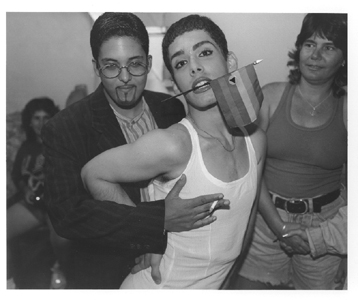|
Paula Allen's Diez
Pesos

Diez Pesos Party, Havana.
(1997) Copyright Paula Allen.
One of Allen's most recently begun
projects deals with the underground alternative lifestyles
in Havana, Cuba. Over the past two years she has documented
the Dies Pesos Parties of Havana and most recently she has
been documenting family life within Cuban Society were the
varying ethnicities of Cuban women are present.
Gisela D. Fosado, a Graduate Student
in Anthropology at the University of Michigan, conducted an
interview with Paula Allen. Both women share an investment
in Cuban life. Although both women are interested in the sex
workers, and marginalization of gays, they approach the
situations differently as far as the purpose of their
documentation. This interview took place on September 25,
1998. The following is a summary.
|
Both Paula
and I work on representations (visual and
narrative) of marginalized communities in
Havana. I took this opportunity to discuss our
work and our different approaches. Since my
return from conducting anthropological field
work last summer, I have been struggling to
maintain my feminist agenda without compromising
my socialist ideals. Paula Allen helped me to
rethink these struggles .
Paula began a
project on lesbians worldwide two years ago. She
first photographed lesbians in Spain and
Ireland, before moving on to Cuba. Once she
began her work in Cuba, it dominated the project
and it is there that she has spent the bulk of
the past two years. Paula work in Cuba is
centered around visual representations of
underground gay parties in Havana.Similar to her
previous work, she is interested in in-depth
representations of few people, mainly her Cuban
friends. Paula Allen has extensively interviewed
her subjects, and works very much in the
ethnographic tradition of participant
observation. She is interested in hearing
stories about life in Cuba by collecting
numerous life histories. She asks them about
their relationships with their family, as well
as other aspects of their lives.
The idea that
sexual relations should be disconnected from
monetary exchange is a narrative that is deeply
ingrained in our "Western" consciousness. In the
history of many societies in the world,
including our own, economic exchange has been
explicitly tied to sexual relationships, and in
particular, the institution of marriage. For all
sorts of reasons, the most obvious being the
economic troubles since the fall of the Soviet
Union, some Cuban sexuality discourses do not
judge behavior along these typically "Western"
moral lines. It is the complicated power
relationships between different Cubans and
tourists that interest me and that I plan to
untangle in my dissertation, through a detailed
analysis of interviews with sex workers in
Cuba.In recent coverage of Cuba sexuality, a
focus has been placed on the exploitation of
girls and young women who are termed
jineteras(hustlers) within Cuba. The overly
simple portrayal of these women in academic and
popular literature often reflects political
struggles unrelated to their situations (i.e.
between Cuban Americans and other actors) and
often reflects a solely superficial knowledge of
sex tourism,a relatively recent phenomenon in
Cuba. These representations ignore the larger
scheme of discourses around hustling in general
and ignore marginalized jineteras and jineteros
(male hustlers), as well as tourists who feel
exploited.
This phenomenon
begs a profound analysis,contextualized within
the larger informal economy of hustling, which
has become crucial to the livelihood of many
Cubans. My interest in this project stems from
previous studies of and concerns with sexuality
discourses (particularly in American college
campuses and also related to domestic violence)
that are ultimately disempowering to women. So
many women find few avenues to conceptualize
gender and sex relations in empowering ways. I
was surprised to find that this is not always
the case in Cuba when I conducted my preliminary
interviews of sex workers last summer (despite
media and academic portrayals of this issue) and
so I became interested in the politics behind
such studies and why they are often such simple
representations of this phenomenon.Thinking
about jineteras becomes a dilemma for me when I
think about the stance the Cuban state has taken
in relation to people marginalized due to their
sexual practices. The sad, thirty year-long
history of discrimination against gays and
lesbians in Cuba has often disillusioned me from
centralization, socialism, and Fidel.
Paula, on the
other hand, has not been haunted by this
quandary.She often repeated during our
conversation that because the matter is so
complex (i.e. there are many great aspects of
life in Cuba and other negative ones), she felt
no need to take a stance. While I often felt
confused about my views on Fidel government, she
emphasized that there was no need to feel
confused. I don't have to choose one
perspective,she repeated. I asked her if it
bothered her that people viewing her photographs
might interpret a political message in her
photographs that is not present, or if it would
bother her that people projected their own
politics onto her photographs despite their
content. She told me that she had no control
over the way an audience might interpret her
work and that she therefore did not worry about
it. Paula, however, had not publicly displayed
her work in Cuba before our
interview.
-Gisela
D.Fosado
|

Diez Pesos Party,
Havana. (1997) Copyright Paula
Allen.
Although the two vary on
their opinions and perspectives, there is a thread
of human concern that binds the two together. One
can read in between the lines that the
marginalization of gays and lesbians is a topic
that has many differing avenues, whether they are
political, social, or private. The dialog that took
place is a step towards global communication on the
subject. These are not myths but real situations
that have a survival ending. Cuba has made being
gay illegal. Yet its economic state is dependent on
the sexuality of its people in the tourist trade
that keeps the country alive.
|
School
of Art and Design Home Page|
Women's
Studies Home Page|
Index|
Paula
Allen|
More
Images
|

